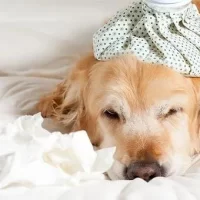What Are the Best Ways to Treat a Pet’s Cold?
- 1. Understanding Pet Colds
- 2. Recognizing Symptoms of a Pet Cold
- 3. Treatment Options for Pet Colds
- 4. When to Seek Veterinary Care
- 5. Preventing Colds in Pets
1. Understanding Pet Colds
Just like humans, pets can catch colds. While it's not always as common in pets as it is in people, a cold in your pet can still lead to symptoms such as coughing, sneezing, and nasal discharge. It’s important to note that colds in pets are typically caused by viral infections, though they can also be triggered by environmental factors such as a drop in temperature or exposure to allergens.
In this article, we explore the best ways to treat a pet's cold, how to recognize the symptoms, and when to seek professional care for your furry friend.
2. Recognizing Symptoms of a Pet Cold
When your pet catches a cold, you may notice a few specific symptoms. These can include:
- Runny nose or nasal discharge
- Sneezing or coughing
- Watery eyes
- Lethargy or decreased activity level
- Reduced appetite
While these symptoms are common with a cold, they can also be signs of more serious illnesses, such as respiratory infections or pneumonia. It's important to monitor your pet and consult a vet if the symptoms persist or worsen.
3. Treatment Options for Pet Colds
If your pet has a cold, there are several ways to help them recover at home. Here are some of the most effective treatment options:
- Keep them warm and comfortable: Ensure your pet has a warm, dry place to rest away from drafts or cold surfaces. A cozy bed or blanket can help them feel better as they rest.
- Encourage hydration: Ensure your pet is drinking enough water. This helps to thin mucus and can alleviate congestion. If your pet isn't drinking, try offering them broth or offering water using a syringe.
- Use a humidifier: A humidifier or vaporizer can help loosen mucus and clear up nasal congestion. This is especially beneficial if your pet has difficulty breathing due to blocked nostrils.
- Maintain a healthy diet: Ensure your pet continues to eat, even if they have a reduced appetite. Providing them with food they love or adding a bit of wet food can entice them to eat and maintain their strength.
In some cases, your vet may recommend over-the-counter medications or other remedies depending on the severity of the symptoms.
4. When to Seek Veterinary Care
Although most colds in pets resolve with simple home care, there are instances when a visit to the vet is necessary. You should seek veterinary attention if:
- Your pet’s symptoms persist for more than a few days
- They develop a high fever
- There is difficulty breathing or wheezing
- Your pet stops eating or drinking altogether
A veterinarian will be able to diagnose the cause of your pet’s cold and provide treatment options that may include prescription medication or more advanced care if needed.
5. Preventing Colds in Pets
Prevention is always better than cure. Here are some ways to prevent your pet from catching a cold in the future:
- Keep them indoors during cold weather: Avoid exposing your pet to extreme cold or damp conditions that could increase the likelihood of them developing a cold.
- Practice good hygiene: Regularly clean your pet’s bedding, toys, and food bowls to reduce the chances of bacterial or viral infections.
- Vaccinate your pet: Regular vaccinations help protect against respiratory illnesses and other common pet diseases.
- Maintain a healthy lifestyle: A well-balanced diet, regular exercise, and proper grooming can help strengthen your pet’s immune system and prevent illness.
By following these steps, you can ensure your pet stays healthy and happy, reducing the risk of them catching a cold in the future.
For more pet care advice and tips, visit Hidden Brook Veterinary.










